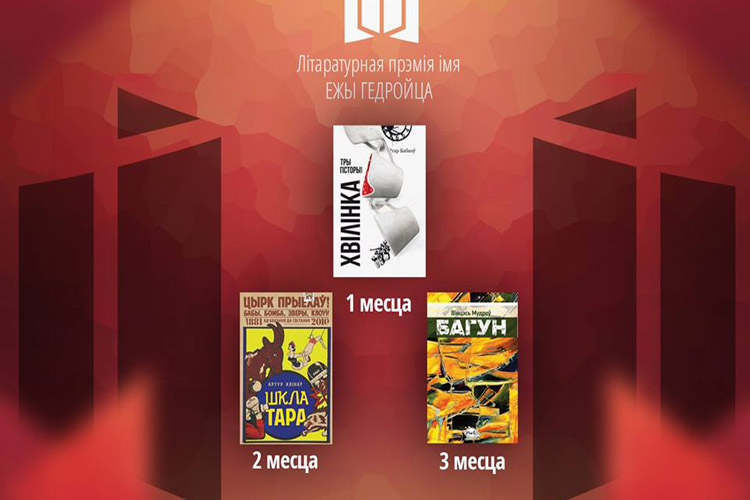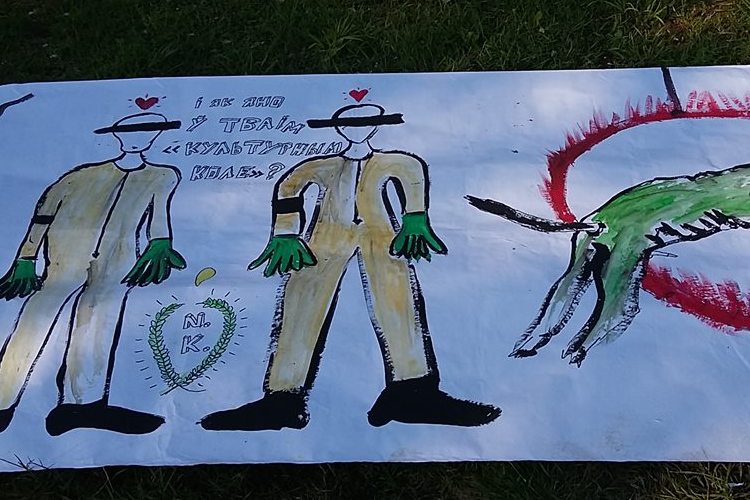
Аўтар: pARTisan, 24/07/2014 | Cult Aktivist LITERATURE project TOP
THE GIEDROYC AWARD IN MONOPOLIZED SPACE
On July, 8 the discussion on the topic «The Giedroyc Award: is There a Strategy?» took place in «ŁohvinaŬ» (Logvinau publishing house) bookshop in Minsk.
Did the years of the award’s existence lead to enhancing of the presence of the Belarusian literature in the book market? Why, then, did the largest literary prize go unnoticed by mass media and received no due resonance? Can we name as a cause of such neglect only those conditions in which independent literature has to survive in our country?
The Giedroyc Independent Literary Award was founded in 2012. In accordance to it the best book written in the Belarusian language is annually awarded. The competition is organized by Belarusian PEN Centre, Belarusian Writers’ Union, the Embassy of Poland in Belarus, Polish Institute in Minsk; the award is supported by «IdeaBank» and the Collegium of Eastern Europe in Wrocław.
Tania Arcimovič: Good evening! We are starting our discussion on the Jerzy Giedroyc Literary Award which ceremony was held this year for the third time. Now I will briefly outline the context of our discussion. The reason for this meeting was Lidzija Michiejeva’s article «Will the Giedroyc Award Save the Belarusian Literature» in the «Biełaruski Časopis» where she monitored the presence of the latest prize-winners in state bookshops and had to make a conclusion about their actual absence and overall bookshop personnel’s ignorance of such a phenomenon. In response to this Sieviaryn Kviatkoŭski in the same «Biełaruski Časopis» reminded of the necessity to keep in mind the context in which the Belarusian literature had to survive, especially the independent one. Namely, he said that «the state lives in the world which is parallel with the people’s world, thus looking for Giedroyc prize-winners in state bookshops and drawing any conclusions based on this is just ridiculous». Nevertheless, I would like to discuss why the largest literary prize went unnoticed by mass media and received no due resonance.
Can we name as a cause of such neglect only those conditions in which independent literature exists in our country? Is everything possible done to make the nominees’ books closer to the mass reader?
I want to introduce you our panelists: Pavał Ancipaŭ (the Jerzy Giedroyc Award secretary, novelist), Sieviaryn Kviatkoŭski (writer, journalist), Aleś Płotka (poet, cultural projects manager). Unfortunately, Lidzija Michiejeva and Saša Ramanava (the editor of a popular media resource kyky.org) have not been able to participate. But we will have more time for the general discussion.

Before giving the floor to the participants, I will read out a few excerpts from Lidzija’s article, which may present the first issues for our talk. I leave the article’s original language which is Russian.
«Why does the interest in the Prize bear no explosive character? Where are the cameras of leading TV channels? Why are Internet materials on the award read so unwillingly? Is there any opportunity to establish a living, working relationship with state-owned bookshops, or we will always remain in our cozy ghetto shops of Łohvinaŭ’s and Višnioŭ’s?
Do the prize founders have any PR-strategy that would help to attract media attention and, as a consequence, to get the hypothetically existing «new» potential reader of Belarusian literature involved? .. And maybe trivially the public just lacks «scandals, intrigues and investigations?»
The main problem of the Belarusian literature is certainly not the deficit of prominent authors and works, but the absence of the book market. Can the award somehow affect the occupation of Belarus by the global Russian or Russian-speaking book market?» (Lidzija Michiejeva «Will the Giedroyc Award Save the Belarusian Literature»).

Sieviaryn Kviatkoŭski / photo by Zaryna Kandracjeva
Sieviaryn Kviatkoŭski: I would like to start with the issue of the state, which arises in Lidzija’s article. State is such an absolute, whereas we are «ghetto». I always take this word in quotation marks because, in my opinion, it is used absolutely not in the correct way. Sometimes I even hear the expression «intellectual ghetto» as the opposite of the mainstream. But there cannot be, in principle, large numbers of intellectuals, otherwise they would not be such. My question is: what about our state? Is it mainstream? What do we get from the list of books sold in state bookshops, which account for 90% of the total book market? We do not discuss the hits of «The Writer’s Bookshop» or those of «The Central Bookshop». In my opinion, we should speak about the existence of two parallel universes, unknown to the general public. So, the state has a monopoly on mass media outlets. Whatever we say about the Internet, the recent data provided by «Genius» showed that among 4.5 million users of the Belarusian Internet only 8-10% are active, that is the remaining 400 000 browse mostly «Odnoklassniki» social network and check up weather broadcast. Here people consume only what the Russian media brings us. That is, in my opinion,
Belarusian state is the same «ghetto», if we talk about literature, which, like a dog in the manger, has taken the possession of information channels, television in the first place, and fails to offer a high-quality product, at the same time not giving publicity to the things which might have become prominent.
Т. А.: It is interesting to note that the independent literary community authors, which are almost impossible to find in state bookshops, represent the Belarusian literature in the international book market. But the question is: if the state is also a «ghetto», how can we get through to the mass reader?
S. К.: OnceUładzimir Arłoŭ together with Zmicier Bartosik traveled across all the regional center of Belarus, which is about 120 towns. They literally came to meet their reader face-to-face. Maybe this is one of the ways.
Aleś Płotka: Of course, Sieviaryn is right. But I would like to speak from my own experience that deals more with communication than literature. To achieve massive success any project should get to the level of mass communication. The example of working with the audience, that Sieviaryn gave, is a horizontal relationship, it is the most effective and reliable one. Because, having visited 120 towns, you can get 2-3 people in each. And these people may stay with you forever.
But this is not the way which would lead you to the mainstream. It is just a qualitative approach to one’s audience. But we wonder whether it can become more popular?
Naturally, to become popular you need to get access to the media. And the award does have these possibilities, but it seems to me that they did not fully work. Of course, it does develop actively as an event of awarding prizes: for example, releases began to be distributed where one can get information about what is happening. I do not know whether there have been attempts to contact any state media, let there be not the issues of the award as such. Since we are well aware that, if we invite the ONT channel at the ceremony where Niaklajeŭ is awared a pize for the best novel of the year, some problems may arise. But if you organize, for instance, Rubleŭskaja’s speech as one of the nominees, the award can be invited to take part in it.
Pavał Ancipaŭ: I can answer. But first, let me get back to the question posed in the article: is there a strategy in the award? The strategy is defintely present: it is the award itself. That is a mass event, which attracts attention. Another question regards its organization. But I can say that we are working at our best. We do not have a professional PR-specialist, because we do not have the money to pay his/her services. Nevertheless, we do send out our releases, keep pages in social networks, update our site.

Lidzija Michiejeva / photo by Arvo Iho
T.A.: Returning to the format of the award, the following thing seems interesting. We see that the focus of the award lies on high quality literature. Does it imply that the award is only for a limited circle of people? Or its goal is in promoting high quality literature to the mass reader? Because if the latter holds true, then perhaps you need not be afraid of using mainstream tools, as well? This is what Lidzija speaks about in her article: maybe there are not enough scandals, intrigues and investigations that usually attract mass public?
А. P.: The award is really developing, nothing appears in a day. Any media recognition — whether it is of an award or an artist — cannot occur overnight. And by now the award has become a platform, still limited by the language factor, but each of its players — from Daškievič to Rubleŭskaja — have a pantheon of their readers.
S. K.: Nevertheless, until there is a state monopoly, the situation will not change dramatically. If such media outlets as the «Komsomolskaya Pravda» or «TUT.BY» get interested in the event, the overall picture would look differently.
Т. А.: I have a question to Aleś as to the former coordinator of «BUDZMA» campaign — one of the most reliable media partners of the award. Of course, a photoreport of the latest ceremony was published and around it there rose a discussion related to the gender dimension. Despite the fact that among the award winners there were two women, in fact they were not seen in the pictures at all. The photographer Alaksandr Ždanovič replied to this remark saying that he just did not know what they looked like, shooting only those people he knew. And this leads us to the question directed to the preparatory campaign because it actually shows that the construction and promotion of the cultural hero does not occur neither before the campaign, nor during or after it. Yes, there is a state monopoly. But as for the independent circle, do media feel that they are able not only to document and talk about the event, but also design it: the image of the hero, for example, or to create tension before the ceremony to make people, actually, want to attend the event? Last time we saw that the audience present was not so numerous. And this is just what is possible thanks to our own efforts.
S.K.: This is a question not to the media. Constructing is not one of their tasks, media only react to what moves or catches the eye. Now we get back to what Pavałhas said: the question about the tools that we have. And this is what we have in our disposition.
P. A.: But there is a question. Does the award have to deal with it? Those are individual departments. It seems to me that the award does its job well, the rest for some reason is not included into this process.

Ales Plotka
А. P.: We have just discussed this case with Tarancina’s photoreport. Tarancinais a prominent photographer, and whose job is it (that of the artist’s or of the award’s) to distribute visit cards, so that at least in the editor’s office people would know what the short-listed writers look like. I tend not to put blame on them, but I wonder how important is it for the award? If you have been misheard or the heroes of your award are not recognized, it means you have not articulated this information well enough.
A professional journalist, obviously, should learn it on his/her own, and be able to find this information, if necessary. But I look at it as a PR-specialist, I must bring this information and not give it at the mercy of editors who can overlook this process.
P. A.: The fact is that the award’s goal is to give publicity not to the faces of the authors, but to the books. And actually the books are distributed.
S. К.: Many of us live under more or less normal conditions. We do not intersect with ideological state institutions, we gather together in bookstores, galleries, visit certain sites, in fact, we live in an apparently normal reality. But in fact, the reality is distorted.
It seems to me that the award’s task is not only to promote books, it is a bit bigger.
Both faces and books of the writers must be recognized. And not only. Book sales, of course, are difficult to organize, but there are such criteria as downloads, for example.
A question from the audience: Would the organizers of the award like to get support from the state?
P. А.: Why not? Bu tat the moment we are more inclined to think of getting support from business structures.
Alena Hapava: My name is Alena Hapava. Sieviaryn, you said that if we lived in a normal market-led country, our literature would flourish. But on the other hand, you speak about state support, support from state media channels.
S. К.: No-one was speaking a bout state support, it was simply a question from the audience. I just record objective reality. 90% of the informational space are monopolized by the state.
It is a sort of raider seizure. It should not happen in principle. But this is already politics.
A.H.: Maybe one should start not with the award, but generally pose a question about what is being done with the Belarusian literature. Are the award-winning books included into educational programs?
S. K.: In such a way we again face a political issue. It is clear that everything is politics, but nevertheless, until the space of the award is more or less independent and uncensored, it should be dealt with. To find support, to encourage professionals, not to fall into confrontation, but to cooperate with the state, when possible. But in any case, we need to understand that … well, these books will not be distributed in state bookshops.

Pavał Ancipaŭ / photo by АУ
P. A.: The representatives of the Ministry of Information are invited at each ceremony, but they do not show up.
A. H.: What is taught and lectured at higher educational establishments? Is there anything that can be found there, on their bookshop shelves?
A remark from the audience: There are several lectures at the faculty of Journalism called «Contemporary Belarusian Literature». Within this course you can choose any writer, and usually those books which are available at the library are chosen.
There are no books from the bookshop «ŁohvinaŬ» there.
A spectator: Universities have their own standardized curricula designed by lecturers who generally read very little, they see contemporary literature as the generation of the 50-year-old ones. This is how it turns out to be…
Т. А.: There have been a lot of different opinions, even topics which deserve separate meeting have been highlighted. Despite the problems, all the participants still mentioned a few positive aspects: the award keeps on developing and it is a fact. Yes, there is a context, the monopolization of space, but nevertheless,
I think we still need to be critical towards ourselves each time wondering whether everything possible has been done, whether every opportunity has been realized. And also we need to be more open, to articulate the problems, because, of course, the strategy of communities in this case works best.
We thank our speakers, as well as those who came to listen to the discussion.
July 8, 2014
Opinions of authors do not always reflect the views of pARTisan. If you note any errors, please contact us right away.





